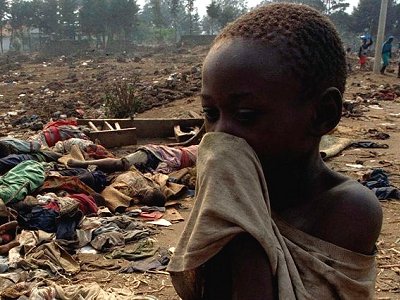
THE KILLING FIELDS
Ethnic conflict is something we know little about, cocooned in politically stable countries. Does it matter that we don't?
Remember Rwanda, Bosnia and Darfur? If so, this puts you in the one half of the British population that does. A poll conducted by Opinion Matters in November 2013 also showed that less than one in four knew that the genocide in Rwanda took place twenty years ago.
Starting on April 7, 1994, the day after President Habyarimana’s plane was shot out of the sky, the Rwandan genocide had been carefully planned by Hutu militia and proceeded to kill around 800,000 people in the space of one hundred days with low-grade weaponry. Rwanda changed everything. The speed, scale and ferocity of the murder of ethnic Tutsi by their tribal neighbours took the international community by surprise. The cynical, initial targeting of the few Belgian U.N. troops in Kigali ensured no nation rushed to intervene. The United States, smarting from its defeat in Somalia, was loath to help, though it did send a small group of Special Forces into the capital to assess the feasibility of doing so; what they saw left them shaken. Ever since, Bill Clinton has worked hard for the welfare of Africans to alleviate the felt guilt of not intervening.
Tony Blair also sought to draw lessons from Western inertia during the Bosnian war, especially the perceived moral equivocation over responsibility for the bloodshed. When violence spilled over in Kosovo during his own premiership, he was quick to sanction an armed response. The first generation of baby-boomer political leaders were soon lampooned as baby-bombers. The high-water mark of liberal interventionism came at the turn of the century when, after Kosovo, British troops intervened to great effect in Sierra Leone to help defeat the brutal RUF militia.
Enthusiasm has waned since. The wars in Iraq and Afghanistan were presented in part as humanitarian when everyone understood there were other more compelling strategic reasons for going to war; neither campaign has ended with a sense that humanitarian gains made are enduring.
When Barack Obama appointed Samantha Power to be US Ambassador to the UN, it was taken as a sign of his commitment to developing the doctrine of liberal interventionism espoused in her book A Problem from Hell: America and the Age of Genocide. Unfortunately for both, she assumed office well into the Syrian Civil War, which probably surpasses any other problem from hell for practical solutions. What history draws from Syria is unclear, not least because there is no end in sight in early 2014. Humanitarian relief is hampered by the brutal and cynical leadership of Assad and the more extreme forces opposing him. Armed intervention is stymied by the memory of Iraq; trying to impose civil society on Damascus in the highly improbable scenario of a successful military campaign by western powers would make the experience of policing Baghdad from 2003 – 2006 look tame by comparison. And this is before we make calculations about the impact on relations with surrounding Sunni and Shia led nations. And yet there is a strong lingering sense that a future generation may judge us for the kind of inertia that reflection exposed over Rwanda and Bosnia. What kind of understanding is called for, when all eventualities are so unclear? There has rarely been a similar need to intercede prayerfully for such depths of wisdom among policy makers than exists now.
Some time ago, I shared lunch with a person who argued that Holocaust Memorial Day was just another example of municipal political correctness. Aside from the insult this aims at a generation of Holocaust victims and their descendents, the Opinion Matters poll demonstrates the value of such a day. Genocide – and all ethnic and religiously motivated conflict short of it – is the bane of our generation. If anything, we know too little about it, cocooned in politically stable countries. The renewal of the act of remembrance in the UK on November 11 over the last decade or so, ignited by a new era of British losses, is an example of how public opinion can be shaped. As the generation of Holocaust victims slowly disappears, there are thousands more reasons why we should enshrine Holocaust Memorial Day in our public life; all of them human.
POPULAR ARTICLES

Obama's Covert Wars
The use of drones is going to change warfare out of all recognition in the next decades.

Through A Glass Starkly
Images of traumatic incidents caught on mobile phone can be put to remarkable effect.

What Are British Values?
Is there a British identity and if so, what has shaped the values and institutions that form it?


